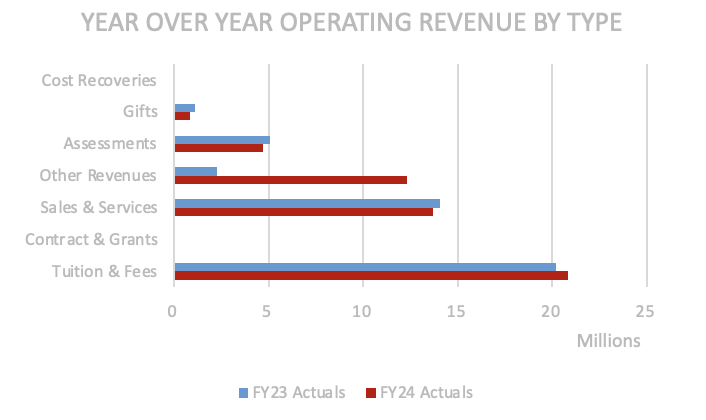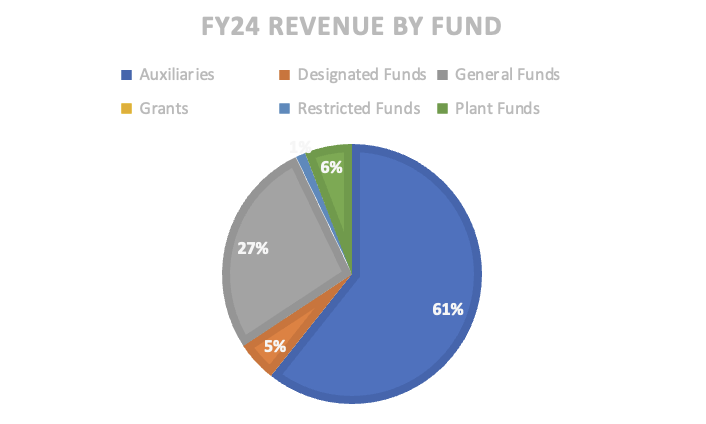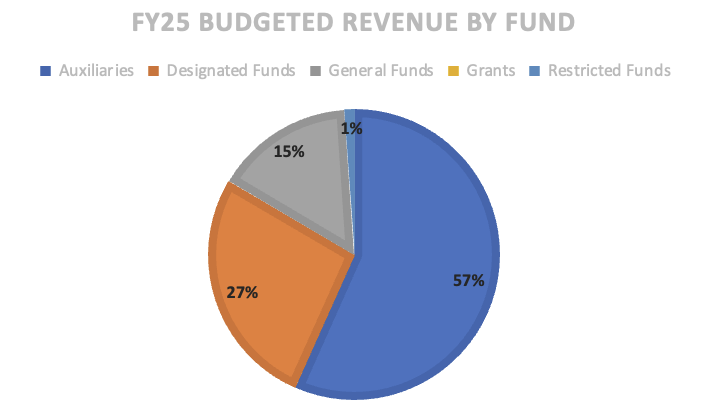The Office of Student Life is comprised of 36 individual departments that are a combination of base or general funds, designated funds, auxiliary funds, and grants. General funds come from the academic units in the form of assessments. These funds are fixed, only increasing to cover cost of living salary adjustments each year. General funds also increase when Student Life is successful in requesting more campus support funding from the Provost. Designated funds are supported by student fees and a small portion of revenue produced, or yearly savings from a general fund department. Auxiliary funds are self-generated revenue and are expected to cover the operation of auxiliary units. Auxiliary units also have plant funds, which are transferred from their operational accounts and used to cover repair and renovation costs. Expenses on these funds, such as depreciation and capital transfers, do not impact actual cash balances. Grants can come from the state or federal level, or from a private organization.
Student Life financial summary
The Office of Student Life underwent significant reorganization during fiscal year 2024, including shifting the Biddle Hotel from the auspices of Indiana Memorial Union (IMU) and moving from the Office of Student Life to Auxiliary Services. The Department of Residence Life along with the Housing Operations & Assignments Office moved from Auxiliary Services to Student Life. The initial fiscal year 2024 budget had revenue and expenses at $49.9M, however after the reorganization, revenue was budgeted at $54M and expenses at $57.7M. While this reorganization resulted in a budgeted loss, fiscal year 2024 actuals, excluding plant fund expenses, resulted in a positive net income of $3.5M.
The positive net income was the result of the following key areas:
- Salary savings of 10% across Student Life
- Student fee income actuals being 7% higher than budget due to higher enrollment
- Total operating expense actuals being 6% below budget
Revenue summary
Total actual revenue for the Office of Student Life in fiscal year 2024 was $66.9M. Student Life received $4.7M in assessment revenue and $7.9M in campus support, which went towards covering expenses on non-revenue generating departments as well as the maintenance of shared space in the IMU. Auxiliary Services transferred $6.7M generated from rent collection as part of Residence Life reorganization, which went into effect on January 1, 2024. Moving forward, the funds provided by Auxiliary Services will increase by the annual cost of living adjustment determined by the university each year.
Auxiliary sales and services represent over 20% of total revenue for Student Life. This revenue was down 2% compared to the prior year and 15% less than what was budgeted for the year. This was due to several factors, including specific revenue generating positions being vacant for a portion of the year, Recreational Sports continuing to build back staff memberships to pre-COVID levels, Counseling and Psychological Services (CAPS) offering free services to students, and to the Health Center also overbudgeting revenue from vaccinations. Despite these challenges, the Auxiliary units of Student Life ended the year with a $1.6M net income in large part by keeping supplies and expenses 14% and total compensation 12% underbudget.
Student fee revenue was 7% higher than what was budgeted due to increased enrollment numbers. Fee revenue supports several Student Life departments such as the Health Center (including CAPS), Recreational Sports, the Indiana Memorial Union, Student Legal Services, and University Student Organizations connected to Student Life units. Fee rates are reviewed by the Committee for Fee Review (CFR) every two years and the apportioned revenue is set for the following two years. CFR is comprised of only students who oversee the departmental presentations and make recommendations on how student fee revenue should be allocated. A fee review will be done in fiscal year 2025 to set the revenue for the next two fiscal years.
Funding Board is a University Student Organization within the Office of Student Life that receives student fee funds. In fiscal year 2024, Funding Board budgeted $332k towards supporting other student organization programs and events. The USO came into fiscal year 2024 with a cash balance over $620k due to unawarded funds during the pandemic. The USO was told during the fee review process to spend down their reserve, however they over-awarded by approximately $220k. As a result, Funding Board decided to honor those awards and reduce the amount awarded in fiscal year 2025 by $220k. Funding Board is student-driven, however Student Life advises the USO and has taken measures to ensure this type of miscalculation does not happen in the future.
Student Life received over $738k in revenue from IU Foundation funds as reimbursement for expenses incurred during fiscal year 2024. $438k were scholarships awarded to students, including $108k from the Beverly Warren Emergency Fund to provide emergency assistance to students facing financial hardship related to basic needs such as housing, food, transportation and more. Over $30k was also used to purchase food for Crimson Cupboard, which offers food and other basic hygiene essentials to students, staff, and faculty free of charge. Over $300k of IU Foundation funds went towards student programming, which provides students opportunities to build community and learn career ready skills such as leadership, communication, and inter-cultural competency. Without the support of our donors, it would not be possible to offer all these impactful opportunities to our students.


Expense summary
Over 52% of total expenses were tied to compensation for fiscal year 2024. The $25M spent on compensation was an increase of 6% from the prior year, however even after adding almost 100 full-time and nearly 700 part-time staff as part of the reorganization during the year, compensation expenses ended the year 10% lower than what was budgeted. Student Life has been conscientious to review how vacant positions tie to the vision of creating a premier and thriving student experience. The result of the positional review has been that some positions were reclassified and other positions have been eliminated. This mission-centric and values-based approach to staffing generated a savings of over $4M, of which 83% were within Auxiliary units and 16% on the general fund. These savings will be used for student programming, one-time initiatives, and deferred maintenance in the next fiscal year.
Auxiliaries spent over $1.5M on deferred maintenance and renovations in fiscal year 2024, with several of these projects rolling into fiscal year 2025. Auxiliary units budget for depreciation expenses which serves as the minimum amount of money they transfer to their plant fund accounts at year end. Auxiliaries also transfer any savings gained during the year and are responsible for maintaining enough funds in their operating accounts to cover at least two months of their expenses. Student Life auxiliaries have a multitude of deferred maintenance and renovation needs that current revenue will not cover. Many of our facilities are aging, undersized, and need to be updated to meet the diverse needs of our growing student body. Student Life leadership is working with the campus to develop a plan that supports auxiliary maintenance and renovation.
Student Life spent over $2M on student programming and events in fiscal year 2024. Involvement-focused programs included IMU Late Nite, the spring carnival, and Rec Fest. Students also had the opportunity to develop their leadership skills through events like Greek Leaders of America and LeaderShape. Student Life also offered several educational events such as Sex, Drugs, and Rock n’ Roll and Come Get Your Pot. In fiscal year 2024, over 20,600 students participated in Student Life programming, with 3.25 being the average number of events a student attended. Many of these events were student-led. Student organizations and student employees worked with staff to budget, plan, and execute events. Student Life programming benefits the student body by creating a sense of belonging, but also by developing career-ready skills for the students who run these events.
The fiscal year 2025 budget for the Office of Student Life is $72.7M, an 8.5% increase over fiscal year 2024 actuals. The budgeted net income is $566k. The Student Life budgeting process is collaborative, with department leaders and Directors involved to make the budget more accurate and create a sense of ownership and accountability. Student Life strives to achieve operational excellence, which includes fiscal understanding and responsibility. Student Life wants to be transparent in budgeting and financial reporting, with the aim to budget positions on the correct accounts, and only those to be filled, reducing the number of transfer of funds transactions, and putting expenses on the correct object codes and in the correct month. The above actions will make reporting easier to understand for non-finance staff and improve the ability for unit leaders to budget their accounts.
The Controller’s Office decided that the department of Residence Life and the Housing Operations & Assignments office needed to be moved off the general fund to designated funds. The move to designated funds resulted in the Student Life general fund budget being 38% less than fiscal year 2024. The reorganization of the department of Residence Life and the Housing Operations & Assignments office was done halfway through the previous year, so only half of their budgets were moved to Student Life. The full-year amount for these budgets in fiscal year 2025 resulted in $9.2 M in additional revenue and expenses.
Revenue summary
Student fees were budgeted at 3.3% less than fiscal year 2024 actuals. This reduction was due to budgeting the student fee amount set by the Committee for Fee Review in fiscal year 2023. While the actual fee revenue is expected to be higher due to increased enrollment, budget planning follows the given number not an assumed number. This planning approach should result in a higher positive net income than budgeted because student fee revenue from fiscal year 2024 was 8% higher than budget, and IUB had an increase in enrollment for the 2024-2025 academic year.
The overall increase in Student Life revenue is due in large part to the budgeted growth of auxiliary sales and services. Recreational Sports budgeted for a slight decrease in sales and services revenue because part of the Bill Garrett Fieldhouse will be closed for renovations related to the School of Public Health. The Student Health Center budgeted an almost $1.5M increase in sales and services revenue with the plan to increase more in-demand services such as physical therapy. The Health Center also anticipates higher insurance reimbursement rates because of the increase of staff physicians. Bradford Woods expects to expand their customer base and generate new revenue by expanding summer camp opportunities and partnering with more IU departments so the facility can be used by more IU students. The IMU has a vision to utilize event space for more student events and programming, prioritizing the space for students.
The IU Foundation implemented a new process for projecting fund revenue, which provides units with a target spend to budget. Student Life budgeted $787k across all IUF funds. 58% of these funds are allocated to financial aid for students. The remaining balance funds programming expenses, professional development, and providing basic needs for students. The emergency and basic needs funds are a priority for the Student Life development team because the number of students who want to utilize these funds continues to increase. Development will also look to increase gifts for auxiliary spaces which will need external funds for building improvements.

Expense summary
Total expenses are budgeted 24% higher than the fiscal year 2024 budget. Compensation is the largest budgeted expense in Student Life, representing 68% of all expenses, but that is down from 72% for the previous year. Actuals are anticipated to be lower due to turnover and salary savings. Overall compensation increased by almost $7.2M due primarily to the addition of the department Residence Life and the Housing Operations & Assignments office having a full year budgeted within Student Life.
There were seven new full-time positions created for fiscal year 2025. Three positions are in Accessible Educational Services to improve the Access Coordinator to student ratio. One position is within the Center for Veteran and Military Students as a certifying school official and one position is in the Student Involvement and Leadership Center as an advisor to IU Student Government. These five positions were approved through last year's Provost Budget Conference request. The remaining two positions are a direct result of the re-organization that expanded Student Life services, the first being a director for a new department, First Generation and Limited-Low Income Programs, and the second is an HR director for Student Life. These two positions were funded by reallocating existing Student Life general funds.
Student part-time wages increased by nearly 50% compared to the prior year budget. Employment on campus improves student retention, providing a sense of connection and community while also preparing students for their career after college. Student Life wants to provide employment opportunities and is developing a more structured approach to student employee engagement. Nearly $3M is budgeted towards student programming and events, an increase of almost 40% compared to fiscal year 2024 actual expenses. Student Life is emphasizing spaces for students to engage with each other and with the IU community, including the creation of a Maker Space in the IMU.
Student academic appointment wages are budgeted at $782K for the 46 graduate students working in Student Life for fiscal year 2025. Almost $1.8M is budgeted for financial aid, of which $1.3M is for the graduate student academic appointment fee remissions. The remaining financial aid budget goes towards departmental scholarships and emergency funding for students for basic needs. Student Life has over 90 scholarships that it manages, with many of these going to multiple students each year.
As a result of the restructuring, multiple units were moved for better functionality and alignment. The Health and Well-Being pillar created a Wellness House which will hold the Substance Use and Intervention Services, Collegiate Recovery Community, and the Student Wellness offices. Student Advocates and Sexual Violence Prevention and Victim Advocacy also moved into new office space for fiscal year 2025. These moves required renovations and new furniture totaling over $300k, which were funded by a combination Health Center and Student Life designated funds. The Student Life designated funds will also cover conference room renovation for the Office of Sorority and Fraternity Life, and furniture needs for the new full-time positions. Auxiliaries are expecting to spend $4.3M in fiscal year 2025 and into fiscal year 2026 on renewal and renovation projects, including new outdoor recreation spaces, continued rebranding of the SRSC facility, cabin renovations and updates at Bradford Woods, and new furniture and restroom updates at the IMU.
As Student Life plans for fiscal year 2026, it is important to keep improving the budgeting process to involve the necessary stakeholders, communicate expectations, and maintain transparency. Defining and documenting the intent of each account, in particular Student Life designated and IUF funds, should make the budgeting process more efficient. A set timeline will be shared with staff that incorporates not only operational account budgeting, but also the internal funding request processes.
There are expenses each year that are challenging to budget because they are unpredictable. One that has significant impact is interpreter services for deaf or hard of hearing students. This is a cost that Accessible Educational Services has had to incur and is often unknown until after budget construction closes. Student Life is working to find a solution that would alleviate this issue for all AES offices across the various campuses.
Student Life strives to be data informed in its decision making. Tying expenses to events and measuring outcomes help Student Life departments create defined metrics for success and then work to improve them. Student Life will continue to standardize the practice to get consistent data, which will help determine future programming and initiatives.

